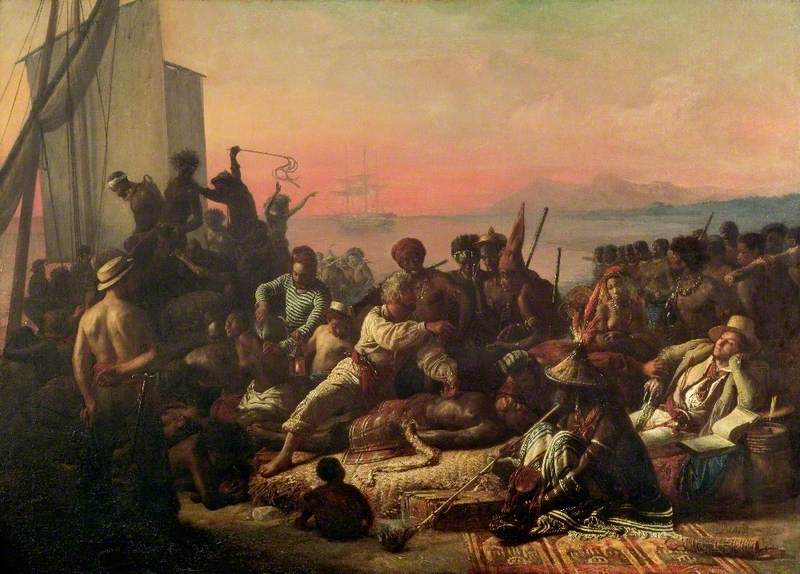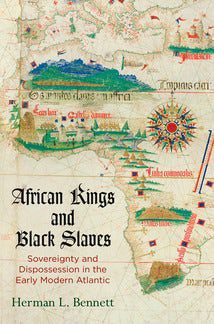Reassessing African-European Encounters

Herman L. Bennett’s African Kings and Black Slaves: Sovereignty and Dispossession in the Early Modern Atlantic, is a prelude to an essential contribution to Anglo-American studies of slavery and the slave trade in the Atlantic world. It is a tour de force historiographical essay. The ideological aims underpinning Herman L. Bennett’s work are rather astute. Bennett offers an incendiary understanding of the 1441 Afro-European contacts against the existing historiography about the Atlantic slave trade. Why should such nuances matter to historians of the African diaspora? To answer this, Bennett’s monograph delineates how European and African interactions are dominated by slavery and the slave trade. Arguably one of the best narratives of medieval and early modern power that predates the political, social, and economic thoughts of subjecthood and sovereignty. Bennett contends that he is interested in rhetoric and performances of lordship alongside the legal regime, ceremonies, and pomp constructive of early modern politics both in the form of sovereignty power and sovereignty (p.3). Bennett redefines a “strategic rereading of the early modern colonial library,” using travelers’ accounts, jurists’ views, and church pronouncements to excavate Iberian political leaders’ and intellectuals’ views of Africa and Africans between the mid 15th to early 16th century. He recognizes the achievement of Sidney W. Mintz and Richard Price in An Anthropological Approach to the Afro- American Past: A Caribbean Perspective, which contends that the divergence in customary practices proper forms modern practices of sovereignty, which Africans supposedly adopted in the early 1600s.
Bennett reemphasizes that the Iberian past offers a more nuanced narrative of the African-European encounter. By overlooking “Catholicism’s institutional history and related intellectual entrants, we have lost sight of a tradition of Christian polities…”(p.5). In addition, Iberians were better placed to offer narratives of the hierarchies they encountered ritually in institutions or transactionally.
As the author notes, his work mediates through more than slave trading and racial differences as he denotes Ira Berlin’s observation that “plantation slavery did not have its origins in a conspiracy to dishonor, shame, brutalize, or otherwise reduce black people’s standing on some perverse scale of humanity—although it did all of those at one time or another.” This has implications for the history of Europe and the African diaspora. Bennett praises Karl Marx’s intervention in the historian’s use of sources and historical processes. In his book Das Kapital (written in the German language), Marx merits the capitalism of the modern era as historical geology of facts that historians have wrongfully alienated in their work.
African Kings and Black Slaves stride similar theoretical grounds as Weheliye’s Habeas Viscus and Gilroy’s The Black Atlantic. It focuses on an earlier and crucial historical moment that a considerable body of scholars and theorists have rendered as a transitional one. Its global interconnectedness connects seemingly distant places and events through––Catholicism, Africa, and the Atlantic slave trade. These were instrumental in forming early Western modernity. Though, Bennett was equally cautious in choosing his lines of advance. He cautions the delineation of laws shaping modern discourses about encounters in the Atlantic world and cautioning “confining the genesis of the transatlantic slave trade to a racial or materialist interpretation of early modern politics” to simplify this outcome. It saddles the social theory of epistemic homogeneous Black subjects.
The diversity of his argument expresses concern over how early critics of the slave trade were silent over the qualms of Christianity. However, he reemphasizes their fears for commerce and sovereignty during the period. Each of his chapters is the blueprint of questions regarding Afro-European sovereignty, polities, and subject status. He resigns his fears that studying the African diaspora cannot be done in isolation. Thus, diasporic identities were shaped by the African experience. Here we are reminded of Ira Berlin’s “creoles.” In addition, he offers a reappraisal of Vincent Brown and Alex Byrd’s studies on understanding African nationalities as a mirror in the study of America. He questions the notion that the Portuguese papal bull of Pope Nicolas V, Romanus Pontifex’s possession of Guinea, is a block to understanding early modern encounters. And that using the rule of law, feudal terms like lords, vassals, and fiefdom to map the landscape as the mediator between Africans and Europeans overshadowed the violence they used to gain power. In Bennett’s view, slavery was only possible through channels constructed by Guinea’s rulers. Portuguese merchants could not violate rules set up by Guinean rulers. Despite the “deviltries” they came with, they had to seek out the lords of the land as he draws from the continuing historiographical salience of Walter Rodney’s A History of the Upper Guinea Coast.
Bennett frames his work around locations. Given the variety of places he uses, it is no doubt that the cover of his book is a telling. His examination of a remarkable number of theories utilizing a section of the corpus and annihilating those he sees misleading is laudable. Safe, too, was the representation of political thoughts in the context of Africans and the enslaved Black person. Barnett argues that historians approach transformation issues using theories conceived by contemporary theorists on slavery despite the complexities of surviving accounts.
Bennett’s multifaceted approach sometimes makes it hard to keep up, but that being said, I am impressed by the sheer amount of research that went into every one of his assertions. This book is dense and systemically answers the questions on the role of early modern politics that focused on constructing kinship, polities, subjecthood, and sovereignty in the Atlantic slave trade. By revisiting contemporary framings of slavery and race, Bennett better understands the geology of power as an essential subject in understanding slavery, grappling with the different contexts of sovereignty he details. One aspect of Bennetts’ compelling work was the stress that he placed on contingency and the context of relatively modern assumptions within the historiography of the slave trade. In keeping with the nuanced attitude he takes regarding the centrality of slavery to modern European political theory, trade relations and its existing avenues shaped the notions of slavery.
Copyright © AAIHS. May not be reprinted without permission.
